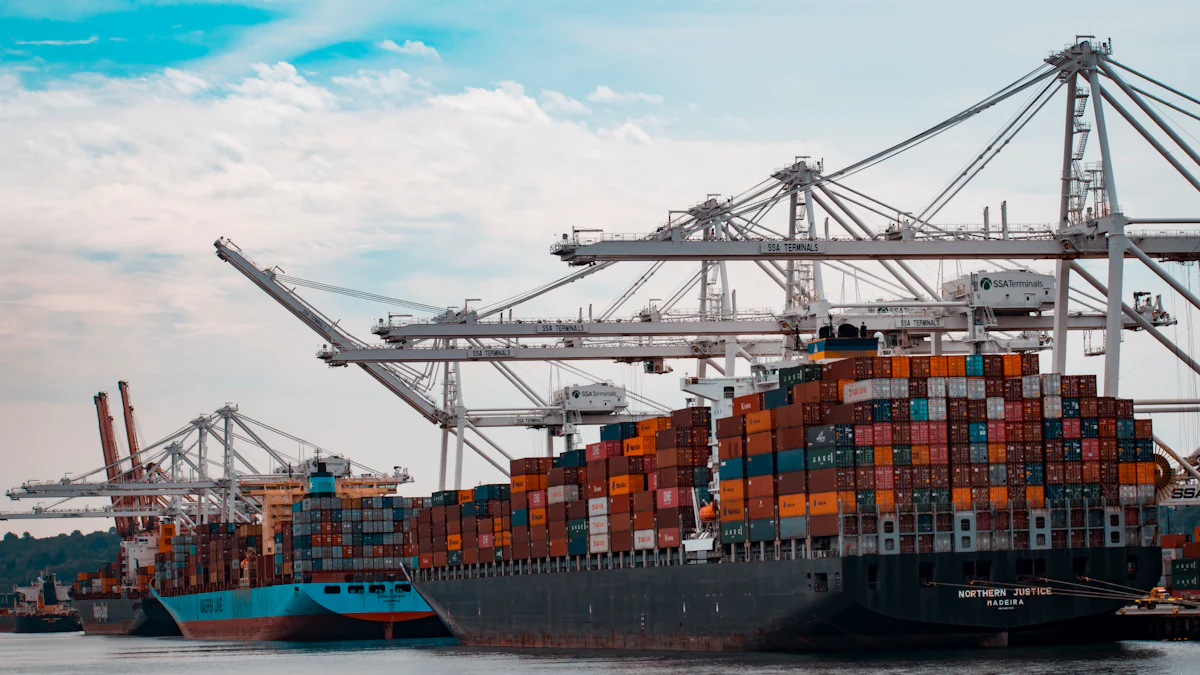Smart Shipping: Asia-US FCL/LCL Options

Smart shipping plays a crucial role in global trade, enhancing efficiency and reducing costs. The Asia-US trade routes serve as vital arteries for international commerce, with containerized imports from Asia to the United States showing significant growth. In May, intra-Asia volumes increased by 14.4%, reaching over 4.5 million TEU. This growth underscores the importance of optimizing shipping options. Full Container Load (FCL) and Less than Container Load (LCL) offer distinct advantages for businesses navigating the Asia-US FCL/LCL Ocean Routes, catering to varying shipment sizes and budget constraints.
Understanding Shipping Options
Full Container Load (FCL)
Definition and Overview
Full Container Load (FCL) refers to a shipping method where a single shipper occupies an entire container. This option suits businesses with large volumes of goods, ensuring that the entire container is dedicated to their shipment. FCL provides a straightforward logistics process, as the container remains sealed from origin to destination.
Advantages of FCL
Security and Control: FCL shipments offer enhanced security since the container remains sealed throughout transit. This reduces the risk of damage or loss.
Faster Transit: With FCL, the container moves directly from the shipper to the consignee, minimizing handling and reducing transit time.
Cost Efficiency for Large Volumes: When shipping large quantities, FCL can be more economical. The cost per unit decreases as the volume increases, making it ideal for bulk shipments.
Disadvantages of FCL
Higher Costs for Small Loads: FCL may not be cost-effective for smaller shipments, as the shipper pays for the entire container regardless of its fill level.
Limited Flexibility: FCL requires enough cargo to fill a container, which may not be feasible for all businesses, especially during low-demand periods.
Availability Issues: During peak seasons, such as before major holidays, FCL containers might be in high demand, leading to potential delays.
Less than Container Load (LCL)
Definition and Overview
Less than Container Load (LCL) involves sharing a container with other shippers. This method is suitable for businesses with smaller shipments that do not require a full container. LCL allows multiple shippers to share space and costs, making it a flexible option for diverse shipping needs.
Advantages of LCL
Cost-Effective for Small Shipments: LCL allows businesses to pay only for the space their cargo occupies, making it a budget-friendly choice for smaller loads.
Flexibility: LCL offers the ability to ship smaller volumes without waiting to accumulate enough goods for a full container. This flexibility is beneficial for businesses with varying shipment sizes.
Ease of Access: LCL containers are often more readily available than FCL, especially during peak shipping seasons, providing quicker access to shipping options.
Disadvantages of LCL
Longer Transit Times: LCL shipments may take longer due to additional handling and consolidation processes at ports.
Increased Risk of Damage: Sharing a container with other shippers increases the risk of damage or loss, as goods are handled more frequently.
Complex Logistics: The logistics of LCL can be more complex, requiring careful coordination to ensure timely delivery and proper handling of goods.
Comparing FCL and LCL

Cost Analysis
Cost Factors for FCL
Full Container Load (FCL) shipping involves a fixed cost structure. Shippers pay for the entire container, regardless of how much space they use. This method becomes cost-effective when transporting large volumes of goods. The cost per unit decreases as the volume increases, making FCL an economical choice for bulk shipments. Additionally, FCL and LCL shipping local charges tend to be lower than those for Less than Container Load (LCL), as the logistics process is more straightforward.
Cost Factors for LCL
Less than Container Load (LCL) shipping calculates costs based on the volume of goods, typically measured in cubic meters (CBM). This method incurs higher costs per unit compared to FCL due to additional logistics and management charges. LCL shipments require more handling and coordination, which contributes to the increased expenses. Despite these higher costs, LCL remains a viable option for businesses with smaller shipments that do not justify the expense of a full container.
Speed and Efficiency
Transit Times for FCL
FCL shipping offers faster transit times compared to LCL. The container moves directly from the shipper to the consignee, minimizing handling and reducing delays. FCL shipments benefit from less complex logistics, allowing for quicker processing and delivery. This efficiency makes FCL an attractive option for businesses prioritizing cost and efficiency analysis in their supply chain operations.
Transit Times for LCL
LCL shipments typically experience longer transit times. The need for consolidation and deconsolidation at ports adds complexity to the logistics process. LCL shipments often wait for other goods to fill the container before departure, resulting in delays. On average, LCL shipments take 1-2 weeks longer than FCL to reach their destination. Businesses must consider these extended timelines when planning their shipping strategies.
Suitability for Different Shipments
Ideal Scenarios for FCL
FCL shipping suits businesses with large volumes of goods. It provides cost efficiency and speed, making it ideal for bulk shipments. Companies dealing with high-value or sensitive cargo benefit from the enhanced security and control offered by FCL. This method also proves advantageous during peak seasons when container availability might be limited.
Ideal Scenarios for LCL
LCL shipping caters to businesses with smaller shipments. It offers flexibility, allowing companies to ship goods without waiting to accumulate enough for a full container. LCL proves beneficial for businesses with varying shipment sizes or those operating on a tight budget. This method provides a practical solution for companies seeking to optimize their shipping costs while maintaining flexibility in their logistics operations.
Asia-US FCL/LCL Ocean Routes

Key Routes and Logistics
Major Ports and Hubs
The Asia-US FCL/LCL Ocean Routes encompass several major ports and hubs that facilitate efficient trade between these regions. Key ports in Asia include Shanghai, Hong Kong, and Singapore, which serve as pivotal gateways for goods destined for the United States. On the US side, ports such as Los Angeles, Long Beach, and New York handle a significant volume of containerized imports from Asia. These ports are equipped with advanced infrastructure to manage the high demand and ensure smooth operations.
Route Optimization Strategies
Route optimization plays a crucial role in enhancing the efficiency of Asia-US FCL/LCL Ocean Routes. Shipping companies employ various strategies to optimize routes, including the use of the Panama Canal, Suez Canal, and land bridge alternatives. Each route offers distinct advantages in terms of transit time and cost. For instance, the Panama Canal provides a shorter path for vessels traveling from Asia to the eastern United States, reducing transit times significantly. In contrast, the Suez Canal serves as a viable option for shipments to the eastern US, offering a balance between cost and speed. Companies must carefully evaluate these alternatives to select the most suitable route for their specific shipping needs.
JUSDA's Role in Asia-US FCL/LCL Ocean Routes
Network and Infrastructure
JUSDA plays a pivotal role in facilitating efficient Asia-US FCL/LCL Ocean Routes through its extensive network and robust infrastructure. With over 155 service points worldwide, JUSDA ensures seamless connectivity across major trade routes. The company's vast warehouse area, exceeding 2,500,000 square meters, supports efficient storage and distribution of goods. JUSDA's strategic partnerships with key ports and logistics providers further enhance its capabilities, enabling it to offer reliable and timely shipping solutions.
Technology and Innovation
JUSDA leverages cutting-edge technology and innovation to optimize Asia-US FCL/LCL Ocean Routes. The company's JusLink intelligent supply chain integrates IoT, cloud computing, and big data to provide real-time visibility and collaboration across the supply chain. This technology enables JUSDA to monitor shipments, track container movements, and optimize logistics processes. By harnessing these innovations, JUSDA enhances the efficiency and reliability of its shipping services, ensuring that clients receive their goods on time and in optimal condition.
JUSDA's Capabilities in Smart Shipping
Innovative Solutions
Technology Integration
JUSDA leads the way in integrating advanced technology into supply chain management. Their JusLink Smart Supply Chain platform harnesses the power of IoT, cloud computing, and big data analytics. This integration transforms traditional logistics processes, breaking down silos and enabling seamless information flow. By embracing AI and machine learning, JUSDA enhances automation and efficiency. These technologies empower businesses to make intelligent decisions, allowing them to respond swiftly to changing market demands.
Process Optimization
JUSDA's approach to process optimization focuses on reducing operational costs and boosting productivity. By utilizing real-time data and analytics, businesses gain valuable insights into their logistics processes. This proactive decision-making approach streamlines production scheduling and optimizes transportation routes. As a result, companies can enhance their overall productivity while minimizing expenses. JUSDA's extensive global network further supports this optimization, ensuring efficient transportation of goods across key markets.

JUSDA Solutions
To provide you with professional solutions and quotations.
Service Offerings
Customized Shipping Solutions
JUSDA offers tailored shipping solutions to meet the unique needs of each client. Their end-to-end services cover every aspect of the supply chain, from raw material procurement to final product delivery. This comprehensive approach ensures a seamless flow of goods, enhancing operational efficiency. By providing customized solutions, JUSDA enables businesses to optimize their logistics operations, reducing costs and improving service quality.
Customer Support and Collaboration
JUSDA prioritizes customer support and collaboration, fostering strong partnerships with clients. Their dedicated team works closely with businesses to understand their specific requirements and challenges. By offering expert consultation and tailored recommendations, JUSDA helps clients make informed shipping decisions. This collaborative approach ensures that businesses receive the support they need to navigate complex logistics landscapes effectively.
Making Informed Shipping Decisions
Factors to Consider
Shipment Size and Volume
Businesses must evaluate the size and volume of their shipments when selecting between Full Container Load (FCL) and Less than Container Load (LCL). Larger shipments often benefit from FCL due to cost efficiency and faster transit times. Conversely, smaller shipments may find LCL more suitable, as it allows for shared container space and reduced costs. Companies should assess their shipping needs and align them with the most appropriate option.
Budget Constraints
Budget constraints play a significant role in shipping decisions. FCL can offer cost savings for bulk shipments, but it may not be feasible for smaller loads due to higher upfront costs. LCL provides a budget-friendly alternative for businesses with limited shipping volumes. By analyzing their financial capabilities, companies can choose the shipping method that best fits their budget while maintaining efficiency.
How JUSDA Can Assist
Expert Consultation
JUSDA offers expert consultation to guide businesses in making informed shipping decisions. Their logistics specialists provide valuable insights into the complexities of global trade. By leveraging their expertise, companies can navigate the intricacies of FCL and LCL options with confidence. JUSDA's team ensures that clients receive tailored advice, helping them optimize their shipping strategies.
"A logistics/freight forwarding expert witness provides expert testimony and opinion on issues related to logistics, freight forwarding, and supply chain management."
Tailored Recommendations
JUSDA delivers tailored recommendations to meet the unique needs of each client. Their comprehensive approach considers factors such as shipment size, budget constraints, and delivery timelines. By offering customized solutions, JUSDA empowers businesses to enhance their logistics operations. Clients benefit from personalized strategies that align with their specific goals, ensuring efficient and cost-effective shipping solutions.
Choosing between Full Container Load (FCL) and Less than Container Load (LCL) shipping options significantly impacts logistics efficiency. FCL offers security and cost benefits for large shipments, while LCL provides flexibility and cost-effectiveness for smaller loads. Selecting the right option ensures optimal shipping strategies. JUSDA supports businesses by offering tailored logistics solutions.
"JUSDA conducted a thorough analysis of Client A's supply chain challenges and tailored solutions to address their specific needs effectively."
Their expertise and innovative approach empower businesses to make informed decisions, enhancing supply chain operations and achieving logistical success.
See Also
Analyzing the Comprehensive Future of LTL Freight
2024: Revealing the Latest in Sea Freight Logistics
Tomorrow's Logistics Revolution: AI in the Supply Chain
